

8 Ways an ADHD Emotional Support Animal Can Transform Your Life
by Lena Park
Last updated: September 6, 2025
Verified and Approved by:
Angela Morris,
MSW, LCSW
Fact Checked

Overview
This article explores the profound ways in which an ADHD emotional support animal can transform the lives of individuals living with ADHD. Many face emotional challenges such as instability, loneliness, and difficulties in social interactions. These struggles can feel overwhelming, but there is hope. An emotional support animal can provide emotional stability, reduce feelings of loneliness, and enhance social skills, offering a comforting presence in times of need.
The roles these animals play in enhancing mental well-being are significant. They encourage physical activity, which is essential for both mental and physical health, and they also provide a sense of companionship that can ease the burden of isolation. Moreover, the legal protections afforded to these animals further illustrate their importance, ensuring that individuals with ADHD can access the support they need in various environments.
Consider how an emotional support animal might positively impact your life or the life of someone you know. Imagine the comfort of having a loving companion who understands your struggles and provides unwavering support. This connection can be life-changing, helping to manage ADHD symptoms and improve overall quality of life.
In conclusion, the journey with ADHD can be challenging, but support is available. Emotional support animals offer not just companionship, but also a path toward emotional stability and improved social interactions. If you or someone you care about is navigating the complexities of ADHD, exploring the option of an emotional support animal could be a compassionate step forward.
Introduction
Navigating the emotional landscape of ADHD can often feel tumultuous. Individuals may grapple with challenges such as anxiety, loneliness, and low self-esteem, which can complicate daily life. Yet, the companionship of an ADHD emotional support animal emerges as a transformative solution, offering not just comfort but also a pathway to improved mental well-being.
As the demand for emotional support animals continues to grow, so too does our understanding of their profound impact on emotional stability and social interactions.
How might these loyal companions reshape the lives of those with ADHD? What essential steps can be taken to integrate their support into everyday routines?
Together, we can explore these vital questions and discover the nurturing support available.
Wellness Wag: Quick Access to Legitimate ESA Letters for ADHD Support
At Wellness Wag, we understand that navigating mental health challenges can be overwhelming, especially for those with ADHD who may find solace in an ADHD emotional support animal. The emotional weight of managing these complexities can often feel isolating, highlighting the importance of having an ADHD emotional support animal. That’s why we offer a streamlined procedure for acquiring authentic Emotional Support Animal (ESA) letters, specifically designed to provide the support you need. By connecting you with licensed medical professionals, our platform ensures that your ESA letters meet legal requirements, facilitating access to essential housing and travel accommodations. This efficient service is here to help you prioritize your well-being and the invaluable comfort your pets provide.
It’s important to recognize that support animals differ from service dogs. While an ADHD emotional support animal offers comfort to individuals facing psychological or mental disorders, they are not trained to perform specific tasks and do not hold the same legal rights as service dogs under the ADA. Understanding this distinction can help clarify the role that an ADHD emotional support animal has in your life.
The growing recognition of the transformative effect of ADHD emotional support animals on mental well-being is evident, with ESA registrations increasing by 50% in the past five years. More individuals are acknowledging how an ADHD emotional support animal can have a profound impact on their lives. Experts emphasize the importance of valid ESA letters, as they not only confirm the need for support but also protect your rights under the Fair Housing Act.
At Wellness Wag, our mission is rooted in a deep belief in the healing power of ADHD emotional support animals. By choosing us, you can confidently secure your ESA letters, ensuring that you receive the compassionate support you need to thrive in your daily life. Remember, you are not alone on this journey; we are here to help you every step of the way.
Enhanced Emotional Stability: How ESAs Help Manage ADHD Symptoms
An ADHD emotional support animal plays a vital role in enhancing mental stability for college students grappling with ADHD. Their presence can significantly reduce feelings of anxiety and impulsivity, offering a soothing influence that aids in managing symptoms.
For students facing psychological distress, ESAs serve as a constant source of comfort, helping with conditions such as anxiety and depression. Research shows that interactions with pets can trigger the release of oxytocin, a hormone linked to bonding and stress reduction.
For instance, studies have demonstrated that oxytocin levels in both dogs and their owners rise during positive social interactions, indicating a mutual benefit that promotes well-being. Furthermore, the calming effects of an ADHD emotional support animal have been associated with improved mood stability in individuals with attention deficit hyperactivity disorder, assisting them in navigating daily challenges more effectively.
The companionship of an ESA can also alleviate feelings of social isolation and provide stress relief amid the pressures of college life. This connection underscores the importance of integrating an ADHD emotional support animal into therapeutic approaches for managing ADHD symptoms, as they not only offer companionship but also support the journey toward a more balanced mental state.
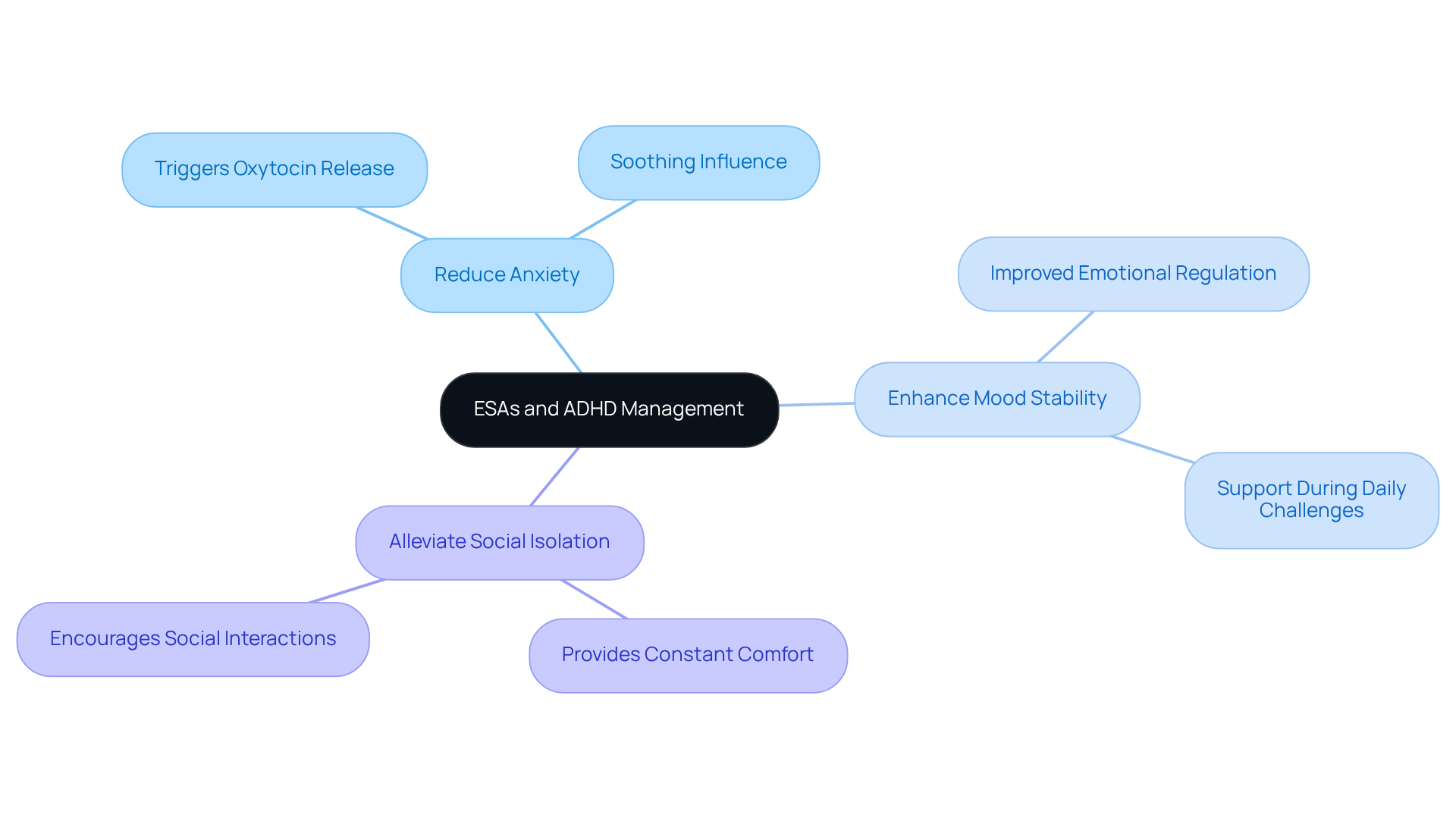
Reduced Loneliness: The Companionship Benefits of ESAs for ADHD Sufferers
Loneliness poses a significant challenge for individuals with attention deficit hyperactivity disorder (ADHD), often deepening feelings of isolation and distress. Emotional Support Animals (ESAs), such as an ADHD emotional support animal, offer a unique form of companionship that can effectively alleviate these feelings. The unconditional love and presence of an ESA nurture a sense of belonging, which is vital for emotional well-being. Research indicates that nearly two-thirds of young adults with ADHD report experiencing loneliness, even in the company of others. In this light, the companionship of an ADHD emotional support animal not only eases loneliness but also fosters social interactions. Individuals may find themselves more willing to engage with others when accompanied by their pets, as the presence of an ESA can act as a social bridge, making social situations feel less intimidating. This dynamic can enhance social skills and create a stronger sense of community, ultimately improving the quality of life for those navigating the complexities of ADHD, especially with the assistance of an ADHD emotional support animal.
Wellness Wag has simplified the process of obtaining an ESA letter, as reflected in the heartfelt testimonials from our satisfied clients. James B. shared, “The approval process for my ESA was easy and hassle-free. Five stars from me!” Similarly, Linda S. noted, “Wellness Wag made getting an Emotional Support Animal a breeze. The staff was very supportive and helpful throughout the process.” These experiences underscore how Wellness Wag not only facilitates the acquisition of an ESA letter but also ensures that clients feel supported and cared for during their journey. By streamlining the steps involved, Wellness Wag allows individuals to focus on the companionship and emotional support that their ADHD emotional support animal provides, effectively addressing feelings of loneliness.
Moreover, loneliness is a pressing public health issue linked to negative mental and physical health effects, with 78% of adults diagnosed with ADHD indicating that loneliness correlates with mental health challenges. Furthermore, loneliness may affect the relationship between ADHD diagnosis and depression in adolescents, highlighting the significant connection between loneliness and mental health issues in this population. As Angelina Jong from King’s College London emphasizes, understanding loneliness within this group is essential for guiding future research and clinical interventions. With Wellness Wag’s commitment to offering accessible ESA letters, individuals can experience the transformative companionship of an ADHD emotional support animal, which alleviates feelings of loneliness and enhances their overall well-being.
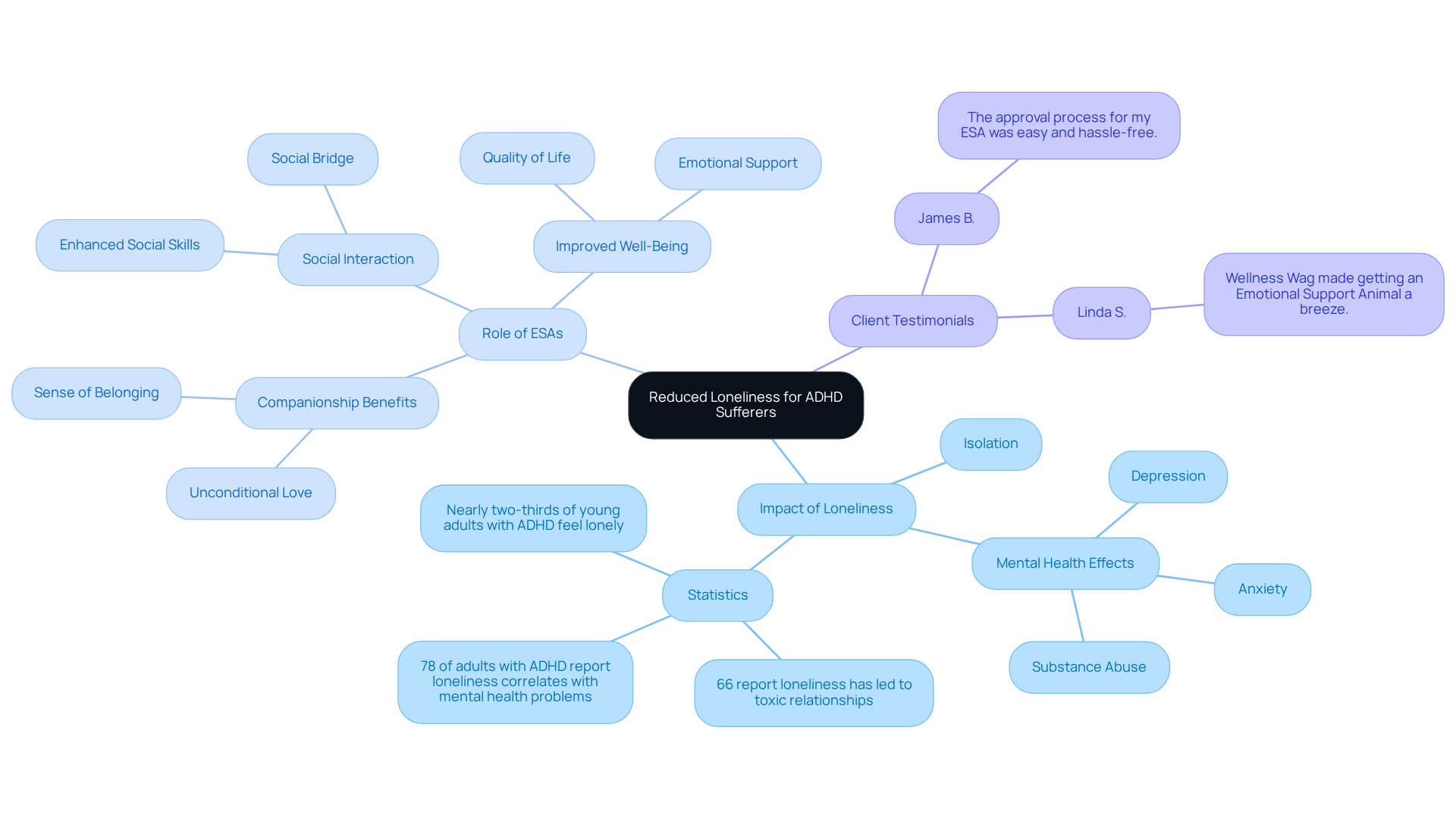
Calming Presence: ESAs as a Source of Comfort for ADHD Individuals
The calming presence of an ADHD emotional support animal can profoundly assist individuals facing the challenges of attention deficit hyperactivity disorder. These remarkable companions provide a soothing influence during stressful moments, helping to ease the emotional turmoil that often accompanies such conditions. Research from the UCI School of Medicine reveals that interacting with pets can lead to a significant reduction in perceived stress levels among children with attention deficit hyperactivity disorder. For instance, children who engaged in petting their therapy dogs showed lower cortisol responses, indicating that these interactions can induce physiological changes that promote relaxation.
Petting or cuddling with an ESA triggers the release of endorphins, fostering relaxation and alleviating anxiety. This soothing impact is crucial for those struggling with attention difficulties, as it helps them regain focus and composure, simplifying their approach to everyday challenges. Many families have shared how their therapy dogs, functioning as an ADHD emotional support animal, have played a vital role in managing symptoms of attention deficit hyperactivity disorder, enhancing social interactions, and providing support during stressful situations. One family, for example, noted that their therapy dog helped their child feel more comfortable in social settings, leading to improved interactions with peers.
Statistics reveal that over 75% of studies demonstrate a positive connection between pet interaction and stress alleviation, particularly for children with attention disorders. This highlights the therapeutic potential of ESAs. By offering comfort and companionship, these animals serve as essential support figures, assisting individuals with attention difficulties in navigating their emotional landscapes more effectively.
To ensure families can access the necessary support in housing environments, especially in university settings where ESAs are permitted, understanding the process of obtaining an ESA letter is essential. This typically involves a consultation with a licensed mental health expert who can assess the individual’s needs and provide the appropriate documentation. Preparing children for the arrival of a new pet is also important, ensuring that the animal meets their needs and fits well within the family dynamic.
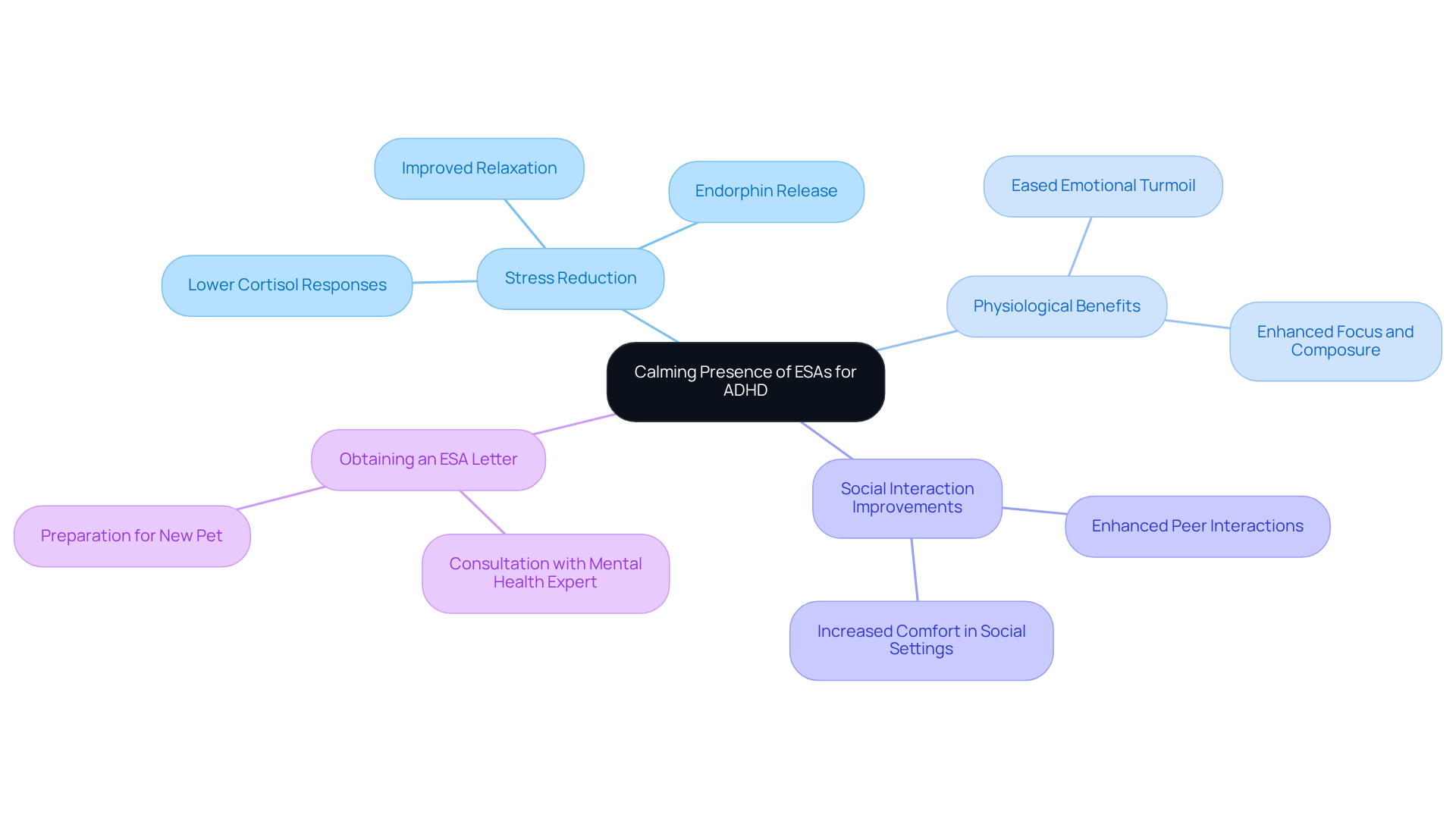
Improved Social Skills: How ESAs Facilitate Better Interactions for ADHD Patients
Individuals with ADHD often face emotional challenges that can make social interactions difficult. The presence of an ADHD emotional support animal can serve as a comforting social bridge, making it easier for individuals to engage in conversations and form meaningful connections. For those experiencing psychological distress, an ADHD emotional support animal provides comfort during high-stress situations, helping to alleviate feelings of anxiety and depressive episodes.
Many college students struggle with homesickness and loneliness, and an ESA can help bridge that emotional gap by offering companionship. Pets naturally act as conversation starters, easing social anxiety and fostering interactions. This can lead to improved confidence in social settings and a greater sense of belonging, especially for those grappling with these challenges.
Furthermore, the calming presence of an ESA can assist students in managing stress, allowing them to focus better on their studies and social interactions. Imagine the relief of knowing that a loving companion is there to support you through tough times. With the right support, including an ADHD emotional support animal, individuals can navigate their emotional journeys with greater ease and connection.
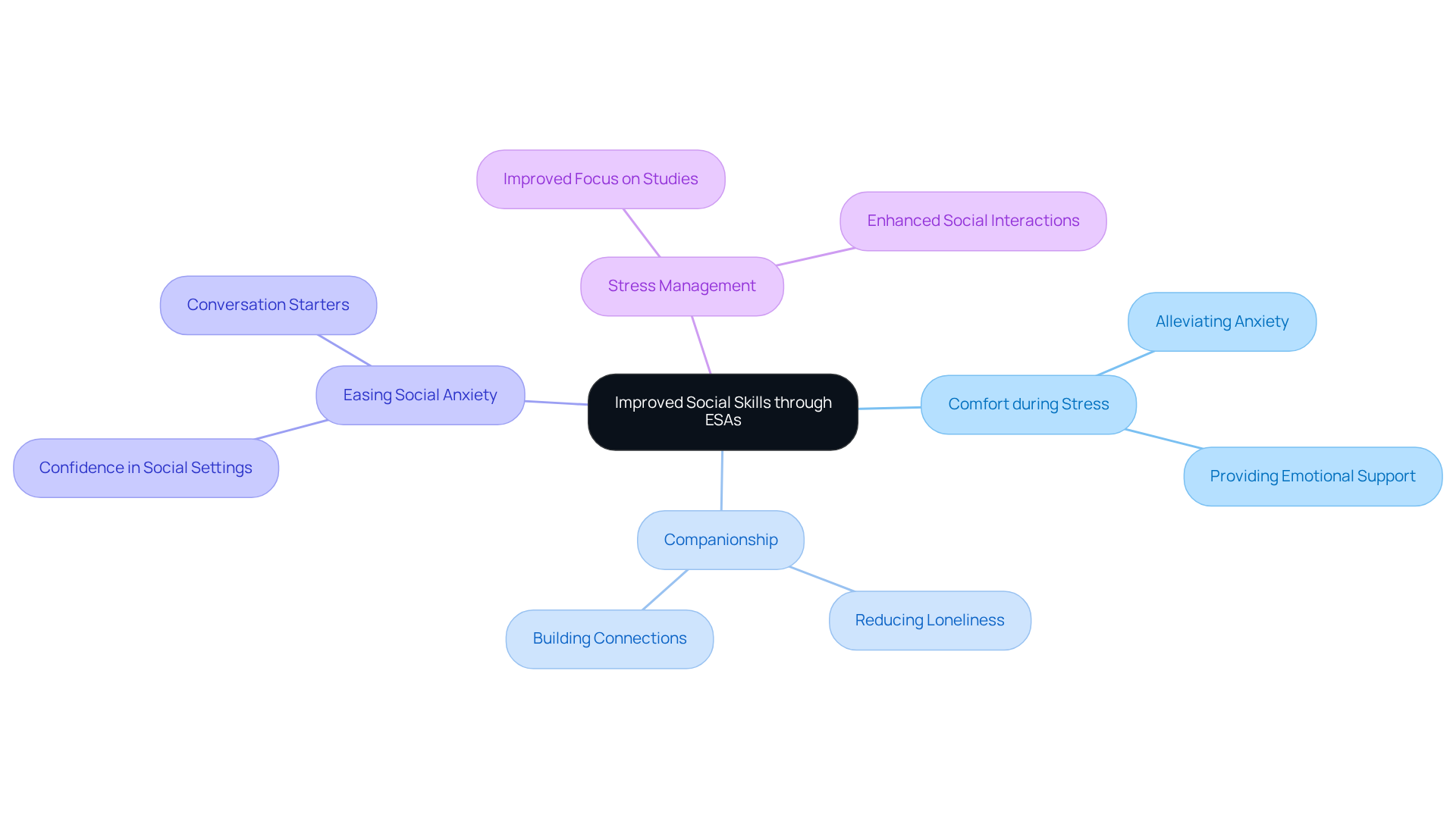
Increased Physical Activity: The Role of ESAs in Promoting Exercise for ADHD
The ADHD emotional support animal plays a vital role in encouraging increased physical activity, which is crucial for managing the symptoms of attention deficit hyperactivity disorder (ADHD). Engaging in routine walks, playful interactions, and outdoor adventures with an ESA not only provides essential exercise but also helps individuals channel excess energy. This physical activity has been shown to uplift mood and enhance focus, making it a key component in managing ADHD.
The companionship of an ESA serves as a powerful motivator, inspiring individuals to remain active and enjoy the beauty of the outdoors. For example, dog owners are four times more likely to meet physical activity guidelines compared to those without dogs, with many achieving the recommended 150 minutes of moderate to vigorous activity weekly through simply walking their dogs. This increased activity not only fosters better physical health but also nurtures emotional well-being, reducing feelings of anxiety and depression often associated with having an ADHD emotional support animal.
Real-life stories illustrate how individuals with ADHD have transformed their daily routines by integrating an ADHD emotional support animal into their lives, leading to enhanced mental health and a more vibrant lifestyle. As Carri Westgarth insightfully remarked, ‘Our findings provide support for the role of pet dogs in promoting and maintaining positive health behaviours such as walking.’
Furthermore, dog ownership promotes social connections and alleviates feelings of isolation, further contributing to community health.
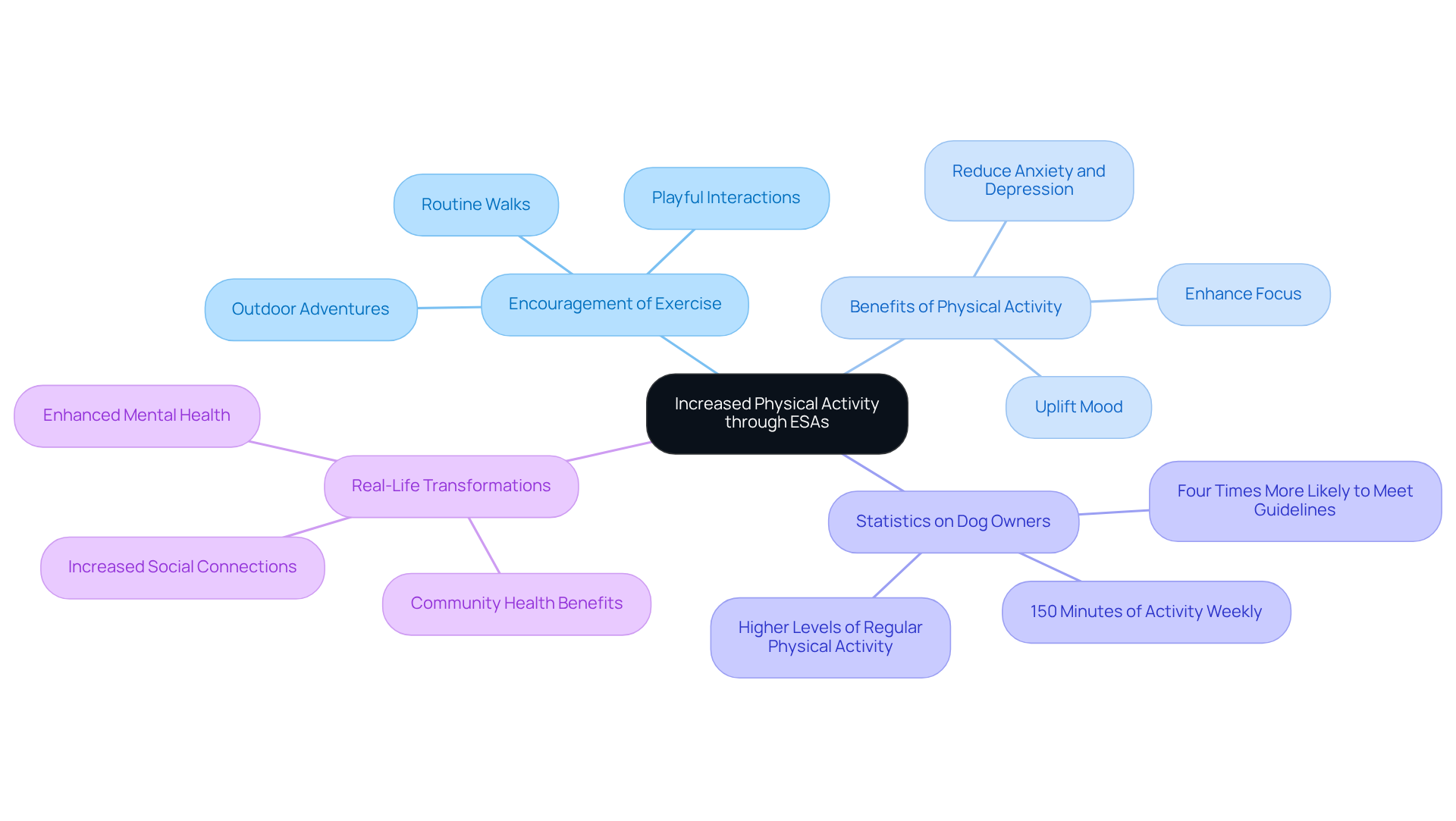
Routine Establishment: How ESAs Assist in Daily Structure for ADHD Individuals
The ADHD emotional support animal plays a vital role in helping individuals with attention disorders navigate their daily lives. These loving companions, known as ADHD emotional support animals, provide essential support, alleviating symptoms associated with ADHD and fostering a sense of stability that many find challenging to achieve.
The responsibilities of caring for an ESA—feeding, walking, and grooming—require a structured routine. This not only cultivates time management skills but also brings a comforting sense of order. Engaging with an ESA encourages the development of healthier habits, leading to improved productivity and mood regulation.
Have you ever noticed how integrating pet care into your daily life can transform your ability to manage time? Research indicates that individuals who do so often see significant improvements, with some studies showing enhancements of up to 30% in time management abilities.
Furthermore, the emotional bond formed with an ESA can motivate individuals to adhere to their routines, shifting their perspective on daily activities. Mental health specialists emphasize that the framework provided by an ADHD emotional support animal is crucial for managing attention disorders, guiding individuals to channel their energy into positive activities, thereby reducing feelings of chaos and enhancing focus.
Additionally, ESAs serve as comforting distractions from stressors, helping individuals redirect their attention and improve their overall well-being. It’s important to note that ESAs are allowed in university housing, ensuring that students with disabilities have equal access to residential life, which further bolsters their mental health and well-being.
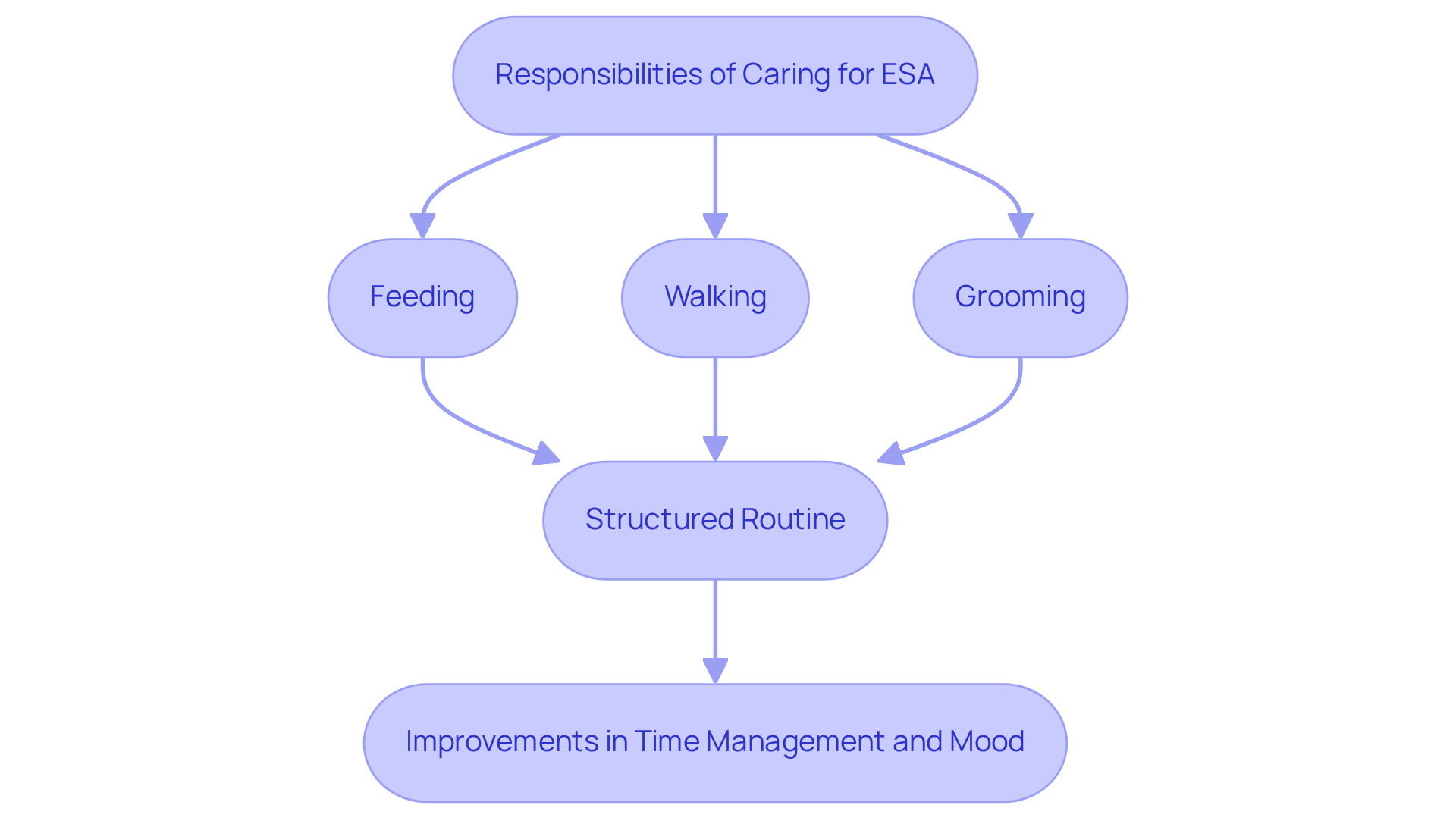
Boosted Self-Esteem: The Confidence-Enhancing Effects of ESAs for ADHD
The presence of an ADHD emotional support animal can profoundly enhance self-esteem for individuals grappling with attention deficit hyperactivity disorder. Have you ever felt the weight of inadequacy that often accompanies ADHD? The unconditional love and acceptance offered by an ESA foster a sense of value and understanding, counteracting those feelings.
Research indicates that around 74% of pet owners report enhanced mental well-being thanks to their pets, highlighting the substantial psychological advantages of animal companionship. Moreover, approximately 18% of pet owners in the U.S. possess support animals (ESAs), reflecting the growing acknowledgment of their mental health benefits.
As individuals embrace the responsibilities of caring for their ESA, they frequently experience a boost in confidence, leading to a more positive self-image. As GAM Medical observes, ‘ADHD emotional support animals’, commonly referred to as ‘therapy dogs’, can offer therapeutic assistance for individuals facing emotional difficulties or mental distress and can thus aid in the treatment of attention deficit hyperactivity disorder.
Practical examples illustrate this transformation: those who effectively manage their ESAs often report enhanced self-esteem and a heightened sense of achievement. This positive reinforcement not only aids in managing ADHD symptoms but also nurtures resilience, encouraging individuals to embrace their unique qualities and capabilities with the help of an ADHD emotional support animal.
The role of unconditional love from ESAs is vital in this journey, as it fosters stability and promotes a healthier self-image. To further enhance your emotional well-being, have you considered adopting an ESA or engaging in activities that involve your pet?
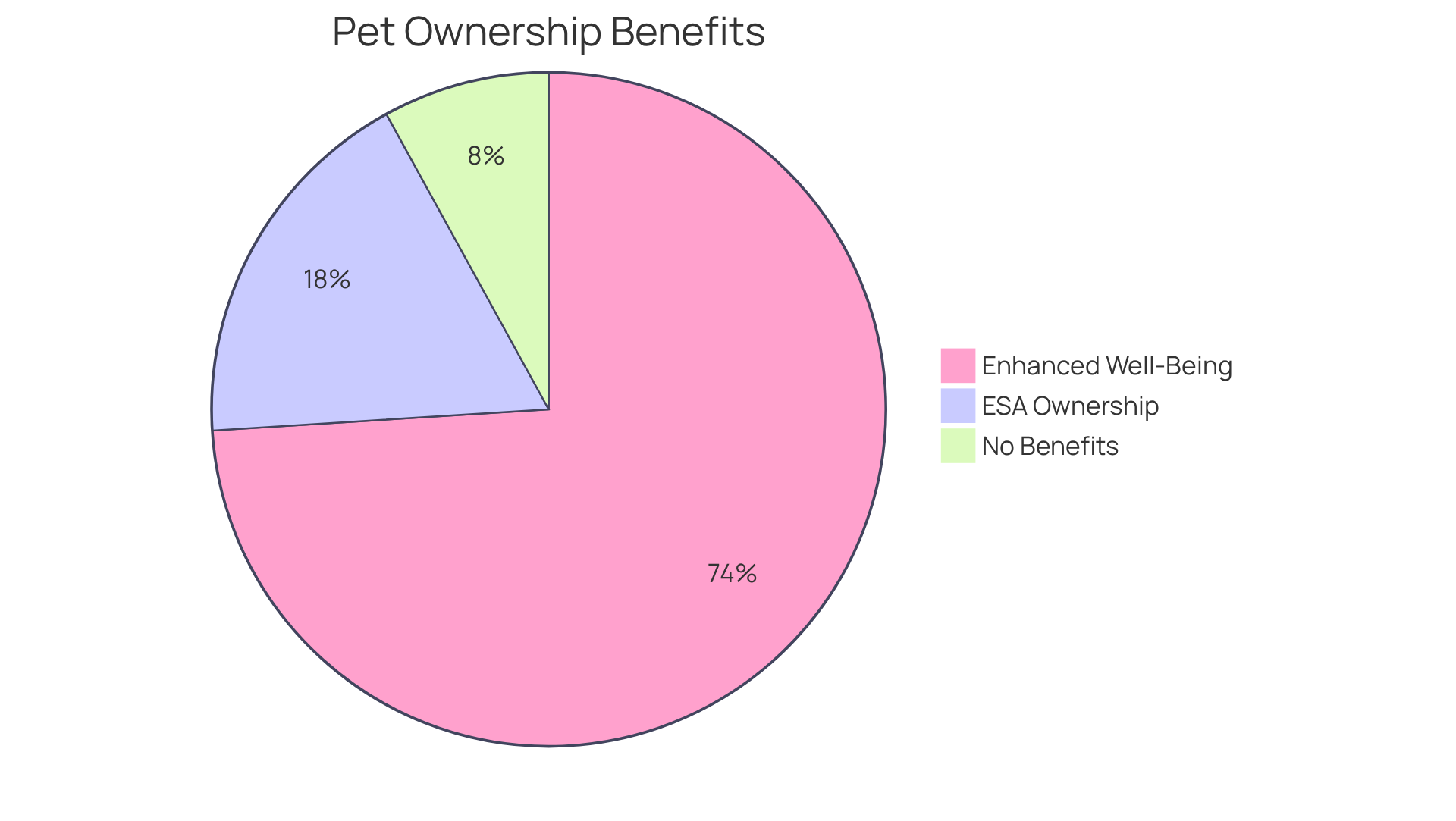
Motivation and Focus: How ESAs Inspire ADHD Patients to Achieve Goals
Emotional Support Animals (ESAs), especially those recognized as an ADHD emotional support animal, serve as transformative companions for individuals facing the challenges of attention deficit hyperactivity disorder. Their presence not only encourages the pursuit of personal goals—whether related to health, social interactions, or daily tasks—but also fosters a sense of responsibility that can enhance focus and commitment. This meaningful bond often results in improved productivity and a deeper sense of accomplishment.
Have you ever noticed how a pet can bring comfort during tough times? Studies reveal that individuals with secure attachments to their pets experience 25% lower anxiety levels, significantly impacting their ability to concentrate and engage in activities. Additionally, a remarkable 84% of ESA owners report noticeable improvements in their mental health, with many sharing stories of increased motivation and diminished feelings of hopelessness thanks to their daily interactions with their furry friends.
By nurturing a supportive environment, an ADHD emotional support animal empowers individuals with attention issues to channel their energy towards achieving their goals, ultimately enriching their overall quality of life. You are not alone in this journey; there is support available to help you thrive.
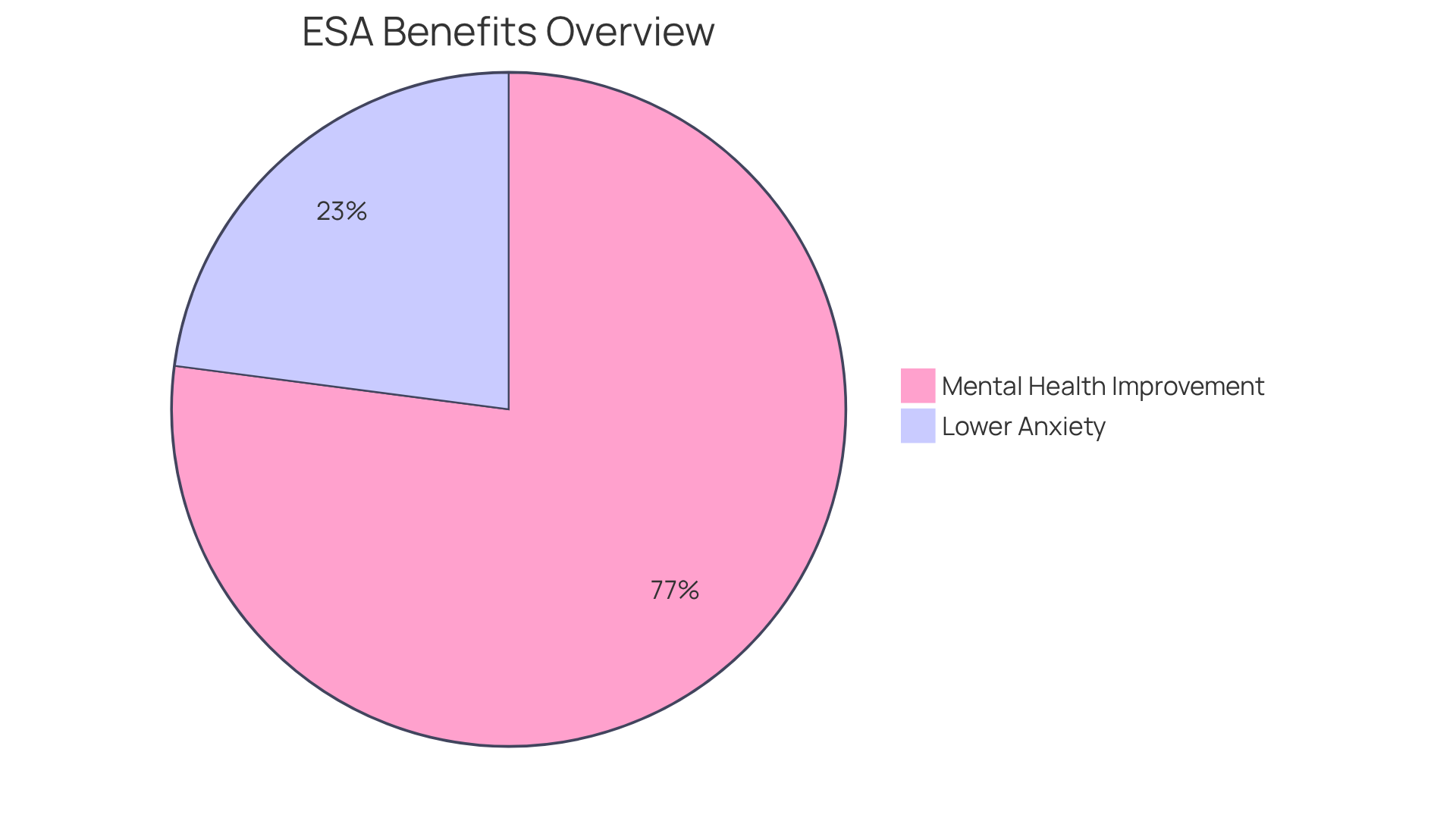
Legal Protections: How ESAs Help ADHD Individuals Navigate Housing and Travel Challenges
Emotional Support Animals (ESAs), such as an ADHD emotional support animal, play a vital role in providing legal protections for individuals with attention deficit hyperactivity disorder (ADHD), particularly in terms of housing and travel. Under the Fair Housing Act (FHA) and the Air Carrier Access Act (ACAA), those with valid ESA letters are entitled to reasonable accommodations. This means they can live with their pets in no-pet housing and travel with them on flights—an essential support for those navigating attention-related challenges. Many individuals with ADHD find that having their ADHD emotional support animal by their side can significantly alleviate heightened anxiety and stress during travel in unfamiliar environments.
Understanding these rights is crucial for individuals with ADHD, empowering them to advocate for their needs effectively. Research shows that 62% of ESA owners reported improved mental health during the pandemic, underscoring the therapeutic benefits of having an ESA. Moreover, the FHA requires housing providers to accommodate ESAs unless the animal poses a direct threat or causes significant property damage. This legal framework ensures that individuals with ADHD can maintain their emotional support systems, including their ADHD emotional support animal, even in restrictive housing situations.
In addition, the ACAA provides guidelines for traveling with ESAs, allowing individuals to bring their support animals on flights. This can offer comfort during travel-related anxiety. As awareness of these legal rights grows, more people with ADHD are discovering that having an ADHD emotional support animal enhances their overall well-being and quality of life. At Wellness Wag, we are committed to empowering individuals through accessible consultations and resources, ensuring that obtaining a legitimate ESA letter is a smooth process that supports your journey toward a brighter, more fulfilling life.
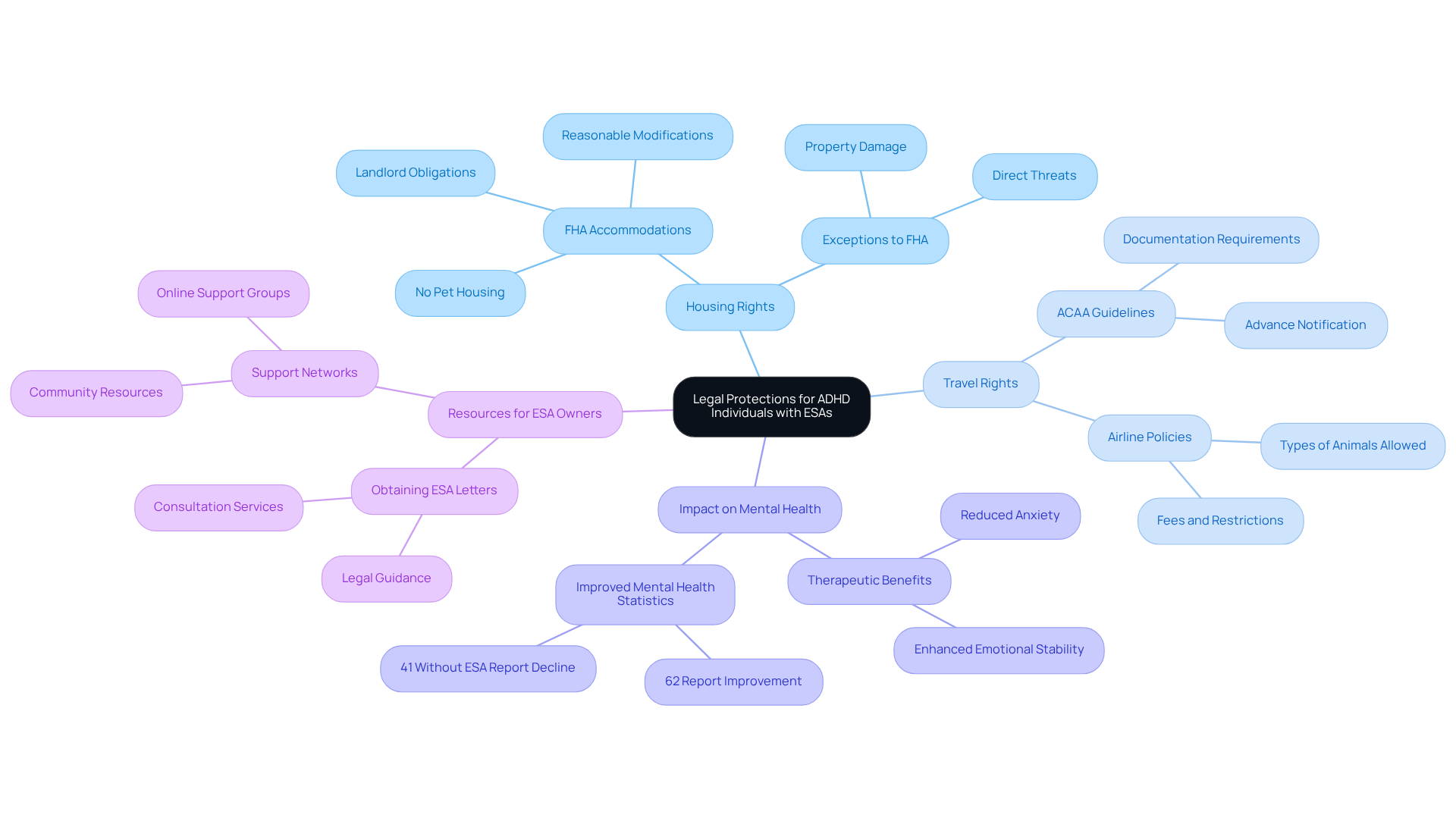
Conclusion
The profound impact of ADHD emotional support animals (ESAs) on individuals navigating the complexities of attention deficit hyperactivity disorder is truly significant. These remarkable companions not only provide emotional stability but also foster a sense of belonging, reduce feelings of loneliness, and enhance overall well-being. Have you ever considered how an ESA might transform daily life? By understanding the myriad ways in which an ESA can make a difference, individuals can better appreciate the value of these relationships in managing ADHD symptoms.
Throughout the discussion, key insights illuminate how ESAs contribute to improved emotional stability, alleviate loneliness, and promote social interactions. Their calming presence can help reduce anxiety and stress. Furthermore, the structure and routine of caring for an ESA encourage healthier habits and time management skills. Can you imagine the comfort of knowing that your ESA is there for you? Additionally, the legal protections afforded to ESA owners ensure that individuals can maintain their support systems in various environments, further enhancing their quality of life.
Recognizing the significant benefits of ADHD emotional support animals is crucial for those seeking to improve their mental health and overall well-being. As our understanding of their transformative power grows, so does the opportunity for individuals to embrace the companionship and support that these animals offer. For anyone considering the integration of an ESA into their life, taking the steps to secure a legitimate ESA letter can pave the way for a more fulfilling and balanced existence. Remember, you are not alone on this journey; support is available, and the companionship of an ESA can be a vital part of your path to healing.
Frequently Asked Questions
What is Wellness Wag and what services do they offer?
Wellness Wag provides a streamlined process for acquiring legitimate Emotional Support Animal (ESA) letters specifically for individuals with ADHD. They connect clients with licensed medical professionals to ensure that ESA letters meet legal requirements for housing and travel accommodations.
How do ADHD emotional support animals differ from service dogs?
ADHD emotional support animals offer comfort to individuals with psychological or mental disorders but are not trained to perform specific tasks. They do not have the same legal rights as service dogs under the Americans with Disabilities Act (ADA).
What impact do ADHD emotional support animals have on mental well-being?
ADHD emotional support animals can significantly enhance mental stability by reducing anxiety and impulsivity. They provide comfort and companionship, which can help manage symptoms of ADHD, anxiety, and depression.
How do emotional support animals help alleviate feelings of loneliness for individuals with ADHD?
Emotional support animals provide companionship that nurtures a sense of belonging, helping to alleviate feelings of loneliness. Their presence can encourage social interactions and make social situations feel less intimidating, ultimately improving the quality of life for individuals with ADHD.
What evidence supports the benefits of emotional support animals in managing ADHD symptoms?
Research indicates that interactions with pets can trigger the release of oxytocin, a hormone associated with bonding and stress reduction. Studies show that the calming effects of an ADHD emotional support animal can lead to improved mood stability and help individuals navigate daily challenges more effectively.
How has the demand for ESA letters changed in recent years?
The registration of emotional support animals has increased by 50% in the past five years, indicating a growing recognition of their transformative effects on mental well-being, particularly for individuals with ADHD.
What do clients say about their experience with Wellness Wag?
Clients have shared positive testimonials about their experiences with Wellness Wag, noting that the approval process for obtaining an ESA letter was easy and supportive, allowing them to focus on the companionship their emotional support animals provide.
Certify Your Emotional Support Animal Today

Why You Can Rely on Us?
At Wellness Wag, we believe your pet deserves care rooted in both science and compassion. Each article is carefully researched, written in clear language for pet owners, and then reviewed by qualified professionals to ensure the information is evidence-based, current, and practical for real-life care. Our goal is to help you feel confident in making informed decisions about your pet’s health and well-being.
Reviewed by
Angela Morris, MSW, LCSW
Angela is a licensed clinical social worker with 20 years of experience in patient advocacy and community mental health. She has assisted numerous clients with ESA evaluations and brings a deep understanding of disability accommodations, ensuring that all information is accurate, supportive, and practical.

Written by :
Lena Park
Last Updated :
September 6, 2025












